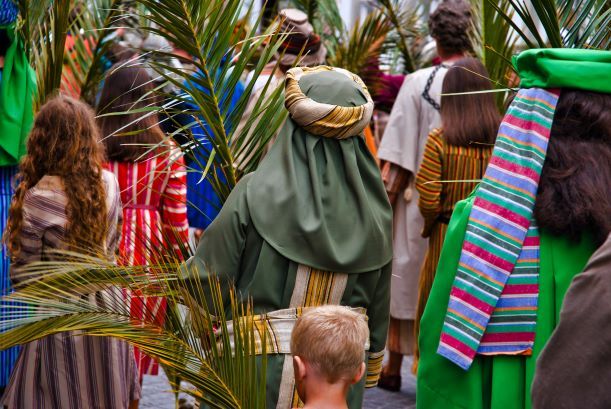From Hosannas to Hatred
A reflection for Palm Sunday

This morning churches all over the world remembered Jesus’s triumphal entry into Jerusalem on Palm Sunday; when the enthusiastic crowd laid palms in the path of Jesus and shouted ‘Hosannah’ that great expression of praise and joy meaning ‘God Saves’.
But this evening, in the Church of England, we are moving into remembering the series of events in Jerusalem that led inexorably to Jesus’s death five days later on what we now call Good Friday.
This evening’s gospel reading is Mark 12: 1-12:
Then he began to speak to them in parables. “A man planted a vineyard, put a fence around it, dug a pit for the wine press, and built a watchtower; then he leased it to tenants and went to another country. When the season came, he sent a slave to the tenants to collect from them his share of the produce of the vineyard. But they seized him, and beat him, and sent him away empty-handed. And again he sent another slave to them; this one they beat over the head and insulted. Then he sent another, and that one they killed. And so it was with many others; some they beat, and others they killed. He had still one other, a beloved son. Finally he sent him to them, saying, ‘They will respect my son.’ But those tenants said to one another, ‘This is the heir; come, let us kill him, and the inheritance will be ours.’ So they seized him, killed him, and threw him out of the vineyard. What then will the owner of the vineyard do? He will come and destroy the tenants and give the vineyard to others. 1 Have you not read this scripture:
‘The
stone that the builders rejected
has
become the cornerstone;[ a
]
this was the Lord’s doing,
and
it is amazing in our eyes’?”
When they realized that he had told t his parable against them, they wanted to arrest him, but they feared the crowd. So they left him and went away.’ (NRSV)
The events in this scripture happened on the Tuesday – two days after his entry into Jerusalem.
On the Monday, having stayed the night in the village of Bethany outside of Jerusalem, Jesus had returned to the city and to the temple, and effectively declared war on the temple authorities by driving out all those selling sacrificial animals and overturning the tables of the money changers.
Then on the Tuesday, he returned to the temple, where the chief pharisees and the scribes challenged him asking by whose authority he was doing these things. Knowing that they were seeking to find reasons to arrest him, he declined to give an answer but instead told the parable of the Vineyard Tenants.
The image of the vineyard, like an olive grove, lies deep in the Mediterranean psyche. It represents a place that is important, precious and well-tended, a place of shade and work, the fruits of which are both profitable and pleasurable. Which is why, in the both the Old and New Testaments, the vineyard is seen as a symbol of God’s relationship with his people.
Isaiah, for example, wrote the Song of the Unfruitful Vineyard (Isaiah 5:1-7) which speaks of how a vineyard owner, full of hope, dug out the land and cleared it of stones, planting it with choice vines, placing a watchtower and a wine press in the centre of the vineyard. A metaphor for how God the father prepared the earth for his greatest creation – man – and watched over and protected his people Israel.
But the vineyard like the people of Israel people failed to live up to expectations. Despite his loving care, the vines and his people grew wild, the result being God’s judgement; the tearing down of the vineyard and the overrun of Judah and the exile of God’s people.
Fast forward 700 years, and Jesus once again speaks of a vineyard. By this time the Lord has brought his people back into the land – the vineyard has been planted once again - and the religious life of the country and its leadership has been restored. And God incarnate goes to the temple, effectively the symbolic watchtower at the heart of the nation’s relationship with God and he accuses the religious leaders of forgetting who this vineyard belongs to.
Once again he talks of a vineyard owner who plants a vineyard, puts a fence around it and digs a pit for a winepress and builds a watch tower ( Jesus emphasises the huge care and investment that the vineyard owner has put into his creation). Then having constructed the vineyard, the owner leases it out to tenants and goes to another country – a fairly common practice in the region in the first century. The tenants were expected to pay the owner about between 30- 50% of the harvest which was a fairly good deal, the owner made all the investment and took all the risks, and the tenants were able to live off the land. It was worked well for everyone, so long as the tenants were loyal.
When the time came, the vineyard owner followed standard practice and sent his servant to the tenants to get his portion of the harvest which was his right. But things don’t go as he expects. In first century Palestine it was also fairly common practice that if the landlord was absent for four years or more then the land could revert to the tenants. And the tenants in Jesus’s parable seem to be under the impression that they are now in charge.
So when a servant appears on the scene, it is a very unwelcome development. And the disloyal servants take him, beat him and send him away empty handed. Undaunted the owner sends a second servant, but this time they strike him on the head and treated him shamefully. The owner was however persistent and sends a third but he, and the others the owner continues to send after him, are killed.
But Jesus’s story goes on; ‘He had still one other, a beloved son. Finally he sent him to them, saying. “They will respect my son” But those tenants said to one another “This is the heir. Come lets kill him, and the inheritance will be ours.”’ In those days if the landowner died, the tenants would be granted ownership of the property. So the reference to the ‘heir’ may mean that they tenants assumed the landowner was dead, but either way, they saw the opportunity to gain ownership of the land.
Jesus uses this parable to both illuminate and condemn. The religious authorities listening to the parable knew that Jesus was telling this parable against them; that he regarded them as the defiant and unfaithful tenants who were usurping the authority of God; who had had rejected, beaten and killed so many of his emissaries – his prophets - over the preceding centuries. One can almost imagine their rising indignation and fury at being so publicly shamed by this itinerant upstart from Nazareth who had no formal authority. And in a matter of days the pharisees would mirror this this terrible narrative. They would reject and kill the beloved son, while seeking to take over his vineyard.
I have always had a bit of an issue with the Victorian portrayal of Jesus as ‘meek and mild’. The Jesus that the gospels portray was so outspoken so critical, and so infuriated the religious authorities of the day, that they were willing to effectively collaborate with their hated oppressors in order send him to the most excruciating death imaginable. Jesus was meek and humble enough to take this suffering upon himself for us, but he wasn’t mild. And his Passion was born out of love.
When I was younger I always wondered why on earth the owner would go on to send his son as debt collector, given the treatment of the servants he had already sent. But Jesus doesn’t imply that the landowner didn’t know what the outcome would be. He knew. And what this parable shows us is the depth of that love. For God loved the world so much that he sent his only begotten son to die for us; to secure God’s harvest. They took him, and killed him and threw him out of the vineyard, his body crucified on a cross outside the city walls.
In just five days, the atmosphere in Jerusalem went from that of adoration to condemnation. The crowd that praised and worshipped Jesus on Palm Sunday, joined with the religious leaders on Good Friday in baying for Jesus’s blood; their cries of ‘Hosanna’ becoming calls for crucifixion. God, the vineyard owner had ‘expected justice but saw bloodshed’. (Isaiah 5:7)
But this is not, of course, the end of the story. While Isaiah’s love song of the vineyard ends with its destruction, Jesus’s parable ends with a promise and great hope.
In telling this tale, Jesus sealed the fate that God planned for him; the pharisees then go away to plot how they can have him arrested and killed. But quoting Psalm 118, Jesus tells the crowd on that day that ‘the stone that the builders rejected has become the corner stone,’ and on this cornerstone is built his worldwide church; 2.4 billion Christians who today – all over the planet – are praising and singing ‘Hosanna, God Save Us’.
We may still be woefully unfaithful tenants, we may still wilfully seek to run our own lives, and at times, we may live our lives as if God was an absent landlord. But we will be forgiven.
The rejected son, will be our salvation. And the resurrected son, has secured our eternal life.
Kate Nicholas is a best-selling Christian author, broadcaster and consultant. Her latest book Soul’s Scribe: Connecting Your Story with God’s Narrative is now available in Christian bookstores, and online at Eden.co.uk, Aslan Christian Books, Waterstones and Amazon Worldwide. You can also find out more about Kate’s writing, broadcasting, courses and events at www.katenicholas.co.uk
Photo by Brady
Leavell
on Unsplash
